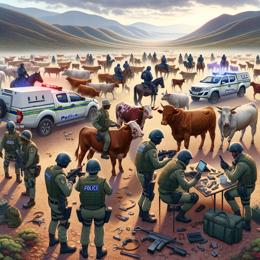Image created by AI
New Regulations on Online Content Sharing: South Africa Clamps Down on Explicit Media and Hate Speech
South Africa is tightening the reins on the distribution of certain types of online content, signaling a significant move towards protecting human dignity and preventing hate speech on digital platforms. The Film and Publication Board (FPB) has issued a stern warning that sharing videos depicting explicit sexual conduct or violations of human dignity can lead to severe legal consequences including fines and imprisonment.
This development comes in the wake of the disturbing events at Zanzou Club, where videos of men being humiliated and assaulted surfaced on social media and were virally shared. The FPB has clarified that while the initial dissemination of the Zanzou Club video might have been intended to report the crime, continued sharing of such content is considered a criminal offense. Violators could face a penalty of up to R500,000 or five years in prison, or both.
The FPB is mandated to shield underaged viewers from inappropriate content and aid adults in avoiding potentially offensive materials. The proliferation of videos like those from the Zanzou Club incident raises serious concerns about such content's accessibility to children, prompting this firm response from the regulatory body.
Adding to the severity, the distribution of private sexual photographs or films without the consent of the individual(s) featured is also a punishable offense, with penalties reaching up to R300,000 or four years in prison.
Moreover, the legal landscape in South Africa regarding hate speech has evolved significantly. With the endorsement of the Preventing and Combating of Hate Crimes and Hate Speech Bill by President Cyril Ramaphosa in May 2024, the framework around hate speech has been clearly defined and expanded. The Bill interprets hate crimes as acts motivated by prejudice against protected characteristics such as race, religion, gender, disability, and more.
Hate speech, whether conveyed through traditional means or modern platforms like WhatsApp and other social media, if done intentionally to provoke hate, will now meet with legal repercussions. Offenders could face up to five years in prison, hefty fines, or a combination of both, with repeat offenders facing even harsher penalties.
This legislative adjustments come at a time when digital interaction is ubiquitous, making it critical for such frameworks to be in place to foster a safer online environment in South Africa.










